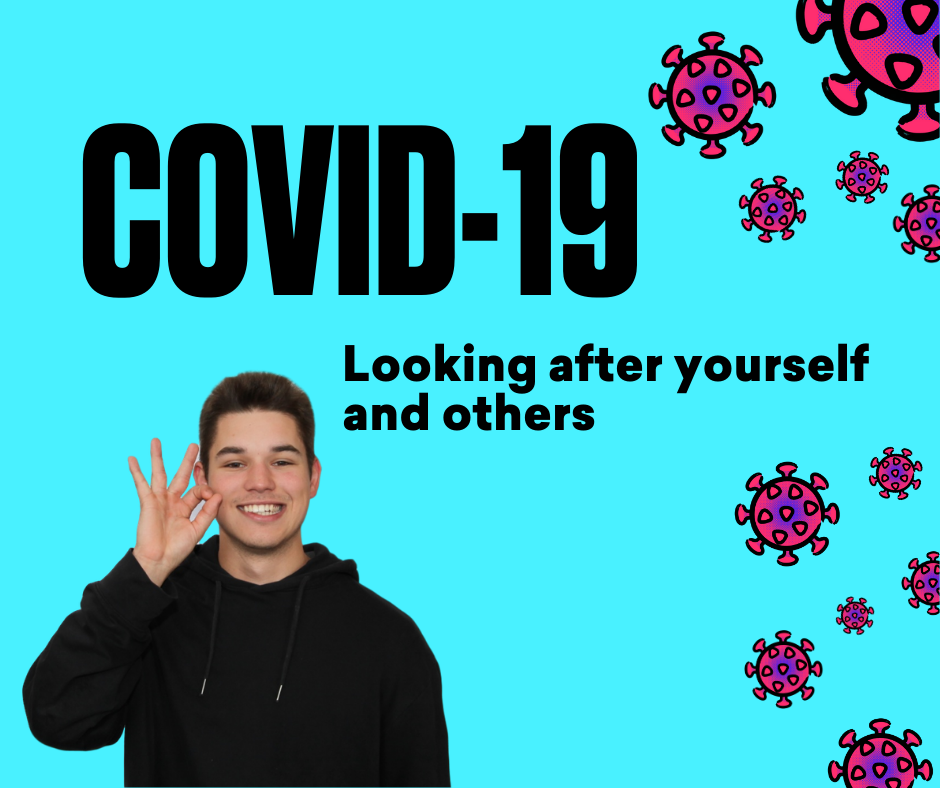
COVID-19: Looking after yourself & others
Stress related to the novel Coronavirus (COVID-19) can leave us feeling anxious and overwhelmed; the constant stream of information, concern about our health, and uncertainty as the situation unfolds can contribute to how we respond to and care for ourselves and others. Further, as things like social isolation or distancing are recommended to help contain the spread of COVID-19, our day-to-day lives are disrupted and our social contact is reduced. As well as these direct impacts, many young people have also been affected by COVID-19 indirectly through the news and social media, or knowing someone who has been affected. Research also shows the living conditions associated with responding to pandemic disasters can be experienced as frightening and traumatic, which may have ongoing impacts on wellbeing.
Common reactions to COVID-19 and social isolation/distancing
- Feeling stressed
- Anxiety and worry
- Sadness
- Feeling helpless
- Frustration or irritability
- Difficulty concentrating or sleeping
- Fear of going to public places
Reactions indicting need for more support:
- Persistent and intense anxiety, worry, insomnia, or irritability.
- Persistently checking your body (e.g., taking your temperature many times each day) or persistently seeking reassurance about your health from doctors, friends, family, or the Internet.
- Performing excessive or unnecessary hygiene precautions, such as wearing a facemask at home or repeatedly washing your hands when there is no need to do so.
- Abusing alcohol or drugs, or overeating, as a way of coping with stress.
- Feedback from friends or family indicating that you seem unusually worried or stressed out.
Holding onto empathy
Fear and anxiety about a disease can lead to social stigma toward people, places, or things. Stigma and discrimination can occur when people associate a disease, such as COVID-19, with a population or nationality, even though not everyone in that population or from that region is specifically at risk for the disease. Stigma can also occur after a person has been released from COVID-19 quarantine even though they are not considered a risk for spreading the virus to others, or individuals who have contracted COVID-19 and are receiving treatment.
It is common in times of crisis to look for someone or something to blame. While this is often an attempt to create a sense of safety or reassurance, blame and anger erode others’ sense of safety and feelings of wellbeing.
Looking after yourself and others
Research indicates that being connected to others is important for our mental and physical wellbeing, with proven links to lower rates of anxiety and depression, higher self-esteem, and greater empathy. While our usual means of connection have been impacted, there are many things we can continue to remain connected, and look after ourselves and each other.
Here are some tips for looking after yourself and the people you love that we’ve pulled together from great info shared by BeyondBlue, headspace, ReachOut, and the Australian Psychological Society:
- Maintain a
routine
Social-distancing and self-isolating are important health measures, and also make it difficult (or not possible) to get to school, work or places we’d usually hang out. Even if it feels weird to be doing normal stuff with everything going on, keeping some kind of routine can help us feel more stable and in control. Try to wake up and eat at regular times if you can, and make time to do stuff you enjoy.
- Engage in
hobbies/fun activities
Writing, music, painting/drawing, cooking, or making things can be a great outlet. Getting creative can be a great way to get out how you’re feeling and also give you something else to focus on.
- Connection
Facetime, skype, texting and calling friends and family help us feel connected without having to leave the house, and regularly checking in with someone is even more important in times of stress. Talking about how we’re feeling and getting support can really help us process how we’re feeling and remind us that we’re not alone. You could even arrange to watch the same movie or tv show while you facetime with a friend!
- Look after your community
You can play an important role in looking after your community by checking in with friends/relatives/neighbours who are self-isolating, offering to run errands or get supplies for others, remaining connected (see above), and speaking up if you see negative statements being made about specific groups or individuals with regard to the virus.
- Balance your
feed
While it is important to stay informed, reading articles and watching videos about the Coronavirus for hours a day can be distressing and even traumatic. Take time to check in with how this stuff is affecting you and make adjustments if you need to; you could take a break from videos and photos and get information from articles instead, and test out limiting how much time you spend looking at Coronavirus media/content (e.g. 20 minutes per day). Again, it’s super important to stay informed particularly when it comes to information and updates from the government and health services, and we suggest seeking out factual and up-to-date information via the Australian Government’s health alert or the World Health Organisation (WHO).
Resources and Information
Below are links to online resources with information about looking after yourself and others:
- Headspace – How to cope with stress related to Novel Coronavirus (COVID-19)
- Coronavirus: How To Talk To Your Kids About The Disease
- Reassuring Children During the COVID-19 Pandemic
- BeyondBlue – Looking after your mental health during the coronavirus outbreak
- Australian Psychological Society – Coronavirus (COVID-19) information and resources
- ReachOut – Self-Care
Where to access support:
- Kids Helpline – call 1800 55 1800 or visit kidshelpline.com.au for support via online chat
- Lifeline – call 13 11 14 or visit lifeline.org.au for support via online chat
- BeyondBlue – 1300 22 4636